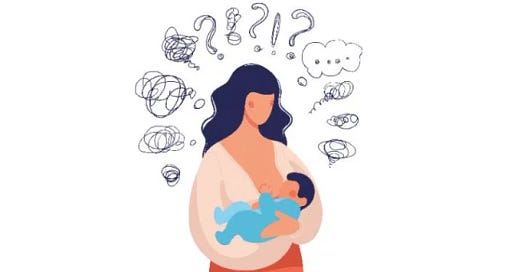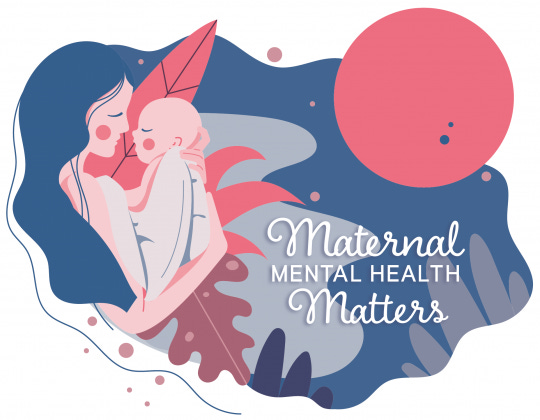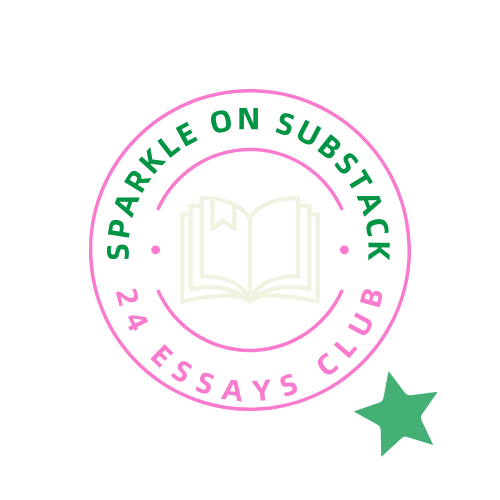Maternal Mental Health: Is Struggle the Norm or a Problem?
Shocking Statistics, Differentiating Between Mental Health Difficulties and Normal Struggles, and How Effectively Support Mothers.
This is a free newsletter about perinatal mental health, motherhood, and matrescence authored by a BABCP Accredited CBT therapist. Sign up now to stay in the loop!
Maternal Mental Health is everyone’s business.
Without healthy mothers, there will not be a healthy future.
Unscrewing Motherhood: Prioritising Maternal Mental Health
From today, Monday 29 April to Sunday 5 May 2024, we celebrate Maternal Mental Health Week. It's a crucial time to focus on the mental well-being of mothers, particularly during the perinatal period. Understandably, due to my clinical role, it is a time of workshops, events, and big discussions. But it is also a time of significant reflection for me as a mother. I vividly remember my first celebrations of this week as a new mum with a young, chubby baby, in the midst of healing from postnatal depression.
Some may wonder why we dedicate an entire week to discussing maternal mental health. The statistics alone paint a stark picture:
The Statistics
1 in 5 mothers develop a mental illness during pregnancy or the first postnatal year.
The known cost of perinatal mental health problems per year's births in the UK is £8.1 billion.
Suicide is a leading cause of maternal death during pregnancy and the first postnatal year1.
These numbers are not just figures; they represent the silent struggles of many mothers. But there's more to discuss beyond statistics. As we approach these celebrations, it's important to address two issues that I frequently encounter in my clinical practice:
Pathology vs Normalcy: There is a tendency to pathologise women's mood and feelings when, in reality, they may be fairly normal responses to the challenges of motherhood. Conversely, there's the risky notion that the struggles of motherhood are “the norm”. From my personal experience, I've encountered both scenarios. When I was drowning in postnatal depression, it was explained away as "baby blues" three months postnatally. Then, when I experienced a normal level of anxiety in my second pregnancy, I found myself subjected to additional appointments with consultants due to my "previous mental health history," which only added to the stress.
Dismissal as Hormonal: On the other hand, mothers’ mental health is sometimes dismissed as simply being attributed to “hormones.” This attitude trivializes genuine concerns and prevents mothers from seeking the help they need.
Image from Politics Home
Normalising Pathology
Early motherhood is undeniably challenging. The intensity of labour, the lack of recovery time (as you're immediately caring for the baby), the common feeling of being lost and constantly asking, "What should I do?" and "Now what?!", along with sleep deprivation and baby blues, are just a few of the difficulties. Postpartum mental health reviews are scarce—usually one with a midwife, one with a health visitor, and one at the six-week postpartum check with the GP. These appointments are often rushed due to strains on the healthcare system, leaving little time to build rapport with mothers and make them feel safe enough to disclose any struggles.
Sometimes, concerns about feeling sleep-deprived, tearful, low, or anxious are brushed off with quick advice like "sleep when the baby sleeps" or "beginnings are always hard; it will get better". Losing mothers who lack support from friends and family, feel isolated and aren't listened to becomes dangerously easy. Birth trauma and labour experiences are rarely discussed—often reduced to "you have a healthy baby; that's all that matters," despite one-third of women suffering from traumatic births2.
As a perinatal CBT therapist, I often tell my colleagues:
"As healthcare professionals, we have only one chance to 'get things right'—one chance to slow down, offer time and empathy, and gently explore. Otherwise, we've failed her, as she will continue struggling in silence”.
Curiosity, time—asking and waiting for a reply—and listening without offering advice are crucial.
Image from: https://a76.asmdc.org/maternal-mental-health
Pathologising Normalcy
Just as mothers' concerns are often brushed off, there are also times when a mother's feelings are labelled as disorders when they might actually be within the spectrum of normal human emotions. For instance, increased levels of anxiety postnatally are common due to changes in the brain during pregnancy and postpartum. Hypervigilance, awareness of danger, and worries about the baby's well-being are normal evolutionary responses. However, it's essential to consider the wider context: Is the anxiety affecting her ability to function? Is she able to cope most of the time?
Postnatal OCD is a specific form of anxiety characterized by intrusive thoughts about harming the baby—either accidentally or intentionally. According to Maternal OCD, 100% of new mothers report unwanted, intrusive thoughts of harming their infants by accident, while 50% have thoughts of harming them on purpose. While these thoughts are a result of natural physiological changes, they aren't always normalised, especially when not followed by compulsions. Often, the label of "OCD" is given straight away, despite the prevalence of perinatal OCD ranging between 2-17%3.
Similarly, women who experience low mood and a sense of loss related to the transition to motherhood aren't always understood. Matrescence—the physiological and psychological transition to motherhood—alters our lives significantly. Imagine your life before expanding your family as a completed jigsaw puzzle, with all pieces neatly arranged. When the baby arrives, that picture is lifted, and the pieces are scattered, with some missing and others new. It takes time to put this puzzle together. It's normal to experience grief, low mood, and a longing for the life we had before, feeling disoriented and like we've "lost ourselves”. Labelling these experiences as simply "postnatal depression" without normalising or considering the broader context is all too common.
Understanding the Difference
Distinguishing between normal feelings and clinical issues is crucial, an art and a science. Over the years, after talking to hundreds of women, the difference to me and my colleagues seems to lie within the persistence of symptoms, their severity, and the impact they have on day-to-day life. It's essential to have unrushed, empathetic conversations, allowing women to tell their stories and explore their feelings, listening without jumping to conclusions.
We need to see if what is happening emotionally, physically, and psychologically is stopping her from being the person she wants to be. Is she feeling that she can cope, or is she asking for help? With the latter, we should never say no. We don't always have to provide professional care; mothers in need are all around us—they may need us to take their toddler or preschooler for a couple of hours so she can spend time with the baby. Or she may need a lasagna or frozen pizza dropped off at her doorstep. Or just someone to listen without offering advice unless she asks. It's also about speaking to a partner about how they can help or support, or sometimes just cheering them up.
Maternal Mental Health is everyone’s business. I say this as a mother of two boys. They might have families of their own in the future, and they need to know how to support their partners. We all need to do more to support mothers—see and listen to them, gently normalise, and be sensitive in offering help and further support if needed. Without healthy mothers, there will not be a healthy future.
Have you ever felt that your emotions as a mother were dismissed as 'normal' when you knew something wasn't right?
How do you differentiate between normal feelings and potential mental health issues as a mother?
What's your opinion on the societal pressure for mothers to 'bounce back' after childbirth, especially regarding their mental health?
In case you missed:
My previous post about Matrescene and bio-psycho-social changes that occur within women during the transition to motherhood —> Motherhood Is Hard Because... and Other Things I’ve Learned
The Maternal Mental Health Alliance has prepared a week-long campaign dedicated to discussing mental health problems in the perinatal period. Please visit their website to familiarise yourself with the schedule.
This is the third post of the Substack challenge Sparkle on Substack 24 Essay Club run by Claire Venus from Sparkle on Substack. Please visit the linked page above to join in if you wish!
Reed, R., Sharman, R., & Inglis, C. (2017). Women’s descriptions of childbirth trauma relating to care provider actions and interactions. BMC Pregnancy Childbirth, 17(1), 21. https://doi.org/10.1186/s12884-016-1196-1
https://maternalocd.org/wp-content/uploads/2022/03/Perinatal-OCD-infographic.pdf
https://iocdf.org/perinatal-ocd/what-is-perinatal-ocd/












Thank you for writing about this and raising awareness!
We are sorely missing our village, where older and experienced mothers can bring perspective to what is the normal passage into matresence and adjusting to life with a new little one; where physical support is more easily available and allowing for a mental break.
Having a baby changes everything. It's not "going on vacation" and coming right back into what was before.
Let's keep listening to and supporting each other.
Another interesting and informative read Aleks 😊 Such an important topic.. I will be delving into the website to learn more.. Thank you 💜